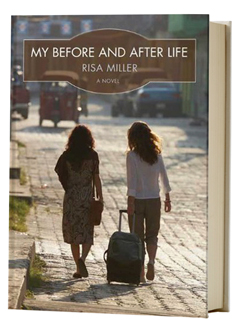




 From Ha'aretz The personal and the political are also inextricably intertwined, less explosively but no less dramatically, in Risa Miller's "My Before and After Life." Most of the action in Miller's book takes place in a suburb of Boston, and while Israel is crucial to the narrative, there is no mention of settlers or religious radicalism. Honey and Susan Black, assimilated Jewish American sisters, come to Israel on a mission to "rescue" their once quite secular father who, while touring the Jewish state, suddenly becomes Orthodox and wants to resettle in Jerusalem. The lightning-bolt speed of Mr. Black's "conversion" requires some suspension of disbelief, especially because the transformation is not dealt with in its particulars. But never mind, Miller's novel is not really about him. It is about his daughters: Susan, a restaurateur and caterer who is fairly materialistic and superficial, but nonetheless charming in her naivete and her simple focus on the here and now; and Honey, a tough-minded lawyer and social activist representing a neighborhood association fighting the expansion of a Jewish day school. Their mother died of breast cancer 28 years earlier, when Honey was 12 and Susan 8. Even though their father played the role of both parents genuinely and well, Honey was deeply affected by the loss (much more so, as a pre-teen, than her younger sister). Nothing changed in this regard even when Dad, as he is consistently referred to, remarried, 15 years after the death of his first wife. He never lives more than two blocks from Honey and remains, along with his new wife, "a true comfort." That is, until he "became observant, Orthodox. Religious" For Honey, this change is experienced as another "loss," a fresh one, which startlingly brings back and intensifies the loss of her mother. Thirty-seven-year-old Honey feels that her father has broken his promise to be close, to be her nurturer. With this ingenious shorthand, Miller deftly takes the measure of Honey's neediness. Of course, Dad, "full of rapture and joy," wants his daughters to join him and their stepmother on what he sees as a beatific journey of preparation to enter what he calls the "Great Hall" - the next world, the world of souls, this world being only a corridor. But he knows his daughters' "agenda" is like something "straight out of a deprogramming manual." The battle lines are drawn, and over the course of several months, Honey, feeling she has been betrayed and abandoned, remains angry. But in Israel and at home she experiences physical, emotional and psychological sensations – let's call them metaphysical rather than religious - connected to the memory of her mother and the idea of the "soul." She begins to feel, without fully grasping, that accepting the soul is the path to retrieving her mother and a way of keeping her father too. She becomes conflicted about her role in the day-school expansion fight, and is moved to wonder why she has condemned her father's choice, and why she is so resistant to his view of the world. But why, Honey also thinks, would anyone, especially a successful professional woman with a husband and family, impose on herself the life of circumscription required by Orthodox Judaism, or orthodox anything? On the other hand, as Risa Miller slyly implies, perhaps Honey's career, or her husband and sons, none of whom we get to know very well, or all of these together, are not so deeply satisfying or meaningful without authentic belief. Though the phrase "tikkun olam" is never mentioned, Honey, through her activism, had thought she was helping to repair the world one social issue at a time. Her father suggests she work on herself first, one mitzvah at a time (lighting Shabbat candles, for example). By illuminating her home, he tells his daughter, she will be better prepared to change the universe. Finally, and to her own surprise, Honey, by allowing the "other world," and her dead mother, into her consciousness, sees the wonder of belief, in the soul, if not in God. Although the denouement is a bit too neat, too dependent on an intervention by a kind of deus ex machina, and too didactic, it is theologically and emotionally provocative. There is something in most people, Honey thinks, that wants to believe in the truth of a non-physical world in which souls not only live, but can make themselves felt in the material world. In response to this idea, Allan, Honey's TV-addicted husband, who we've been led to think is indifferent, says the right thing: "The truth is, no one could know it wasn't true." Her father takes a more absolutist posture. Suffering, he says, is obvious proof that there's an eternal soul, because we can't possibly fit the pain and the evil that we see and experience into our worldly idea of justice. He argues that there has to be more to the story. Maybe. In any case, Mr. Black's Orthodox belief, as depicted by Risa Miller, has mostly benign consequences. |
Click here to return to the reviews on My Before and After Life
